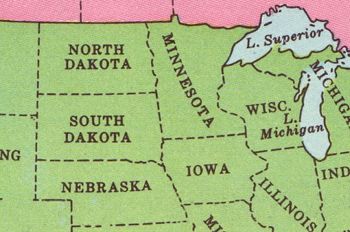South Dakota (U.S. state): Difference between revisions
imported>James F. Perry (link fix, additions to outline (history)) |
imported>James F. Perry (state legislature, governor) |
||
| Line 2: | Line 2: | ||
[[Image:North mid west.jpg|right|350px]] | [[Image:North mid west.jpg|right|350px]] | ||
'''South Dakota''' is one of the states constituting the [[United States of America]]; it entered the Union as the 40th state on November 2, 1889, the same date as [[North Dakota]]. Its area is 77,116 square miles (199,730 square kilometers). Its estimated population in 2008 was 804,194. South Dakota is a Great Plains state bordered on the north by North Dakota, on the east by [[Minnesota]] and [[Iowa]], on the south by [[Nebraska]], and on the west by [[Wyoming]] and [[Montana]]. The state is split by the upper [[Missouri River]] into "east-river" and "west-river" regions. The capital is [[Pierre, South Dakota|Pierre]]. | '''South Dakota''' is one of the states constituting the [[United States of America]]; it entered the Union as the 40th state on November 2, 1889, the same date as [[North Dakota]]. Its area is 77,116 square miles (199,730 square kilometers). Its estimated population in 2008 was 804,194. South Dakota is a Great Plains state bordered on the north by North Dakota, on the east by [[Minnesota]] and [[Iowa]], on the south by [[Nebraska]], and on the west by [[Wyoming]] and [[Montana]]. The state is split by the upper [[Missouri River]] into "east-river" and "west-river" regions. The capital is [[Pierre, South Dakota|Pierre]]. | ||
==Land== | ==Land== | ||
| Line 19: | Line 15: | ||
==Politics and government== | ==Politics and government== | ||
For most of its history, South Dakota has been a strongly Republican state. Since World War II, the state has voted Democratic in the quadrennial Presidential elections only once (1964) and the Governor's office has been occupied by a Republican for all but 9 of the past 74 years. | |||
The current governor of the state, [[M. Michael Rounds]], a Republican from [[Pierre, South Dakota|Pierre]], is in his second term of office, having been elected to the post in 2002 and re-elected in 2006. | |||
The state legislature is elected from 35 districts, each of which elects 2 members to the state House of Representatives and 1 member to the State Senate. Currently the state House of Representatives consists of 46 Republicans and 24 Democrats while the state Senate consists of 21 Republicans and 14 Democrats. | |||
* Finance and taxation | * Finance and taxation | ||
* current issues | * current issues | ||
| Line 30: | Line 31: | ||
==Social, cultural, and educational== | ==Social, cultural, and educational== | ||
===Education=== | |||
The [[University of South Dakota]], situated in [[Vermillion, South Dakota|Vermillion]], opened in 1882. [[South Dakota State University]] in [[Brookings, South Dakota|Brookings]] was established in 1881. | |||
* Media | * Media | ||
* Libraries | * Libraries | ||
* Arts | * Arts | ||
| Line 37: | Line 41: | ||
==Parks and recreation== | ==Parks and recreation== | ||
===Points of interest=== | |||
The most important tourist attraction of the state is [[Mount Rushmore National Memorial]], in the [[Black Hills]]. Here 60 feet (18 m) high heads of four former United States presidents can be admired: [[George Washington]](1732–1799), [[Thomas Jefferson]] (1743–1826), [[Theodore Roosevelt]] (1858–1919), and [[Abraham Lincoln]] (1809–1865). | |||
* State parks | * State parks | ||
* Federal lands (National Parks, National Forests, Wilderness areas) | * Federal lands (National Parks, National Forests, Wilderness areas) | ||
==History== | ==History== | ||
Revision as of 17:28, 7 September 2009
South Dakota is one of the states constituting the United States of America; it entered the Union as the 40th state on November 2, 1889, the same date as North Dakota. Its area is 77,116 square miles (199,730 square kilometers). Its estimated population in 2008 was 804,194. South Dakota is a Great Plains state bordered on the north by North Dakota, on the east by Minnesota and Iowa, on the south by Nebraska, and on the west by Wyoming and Montana. The state is split by the upper Missouri River into "east-river" and "west-river" regions. The capital is Pierre.
Land
- Physiography (land forms)
- Rivers and drainage, lakes
- Climate
- Soil
- Flora
- Natural "resources"
Demographics
- including native peoples
Politics and government
For most of its history, South Dakota has been a strongly Republican state. Since World War II, the state has voted Democratic in the quadrennial Presidential elections only once (1964) and the Governor's office has been occupied by a Republican for all but 9 of the past 74 years.
The current governor of the state, M. Michael Rounds, a Republican from Pierre, is in his second term of office, having been elected to the post in 2002 and re-elected in 2006.
The state legislature is elected from 35 districts, each of which elects 2 members to the state House of Representatives and 1 member to the State Senate. Currently the state House of Representatives consists of 46 Republicans and 24 Democrats while the state Senate consists of 21 Republicans and 14 Democrats.
- Finance and taxation
- current issues
Economy
- Agriculture and livestock
- industry (manufacturing)
- Mining
- Transportation
Social, cultural, and educational
Education
The University of South Dakota, situated in Vermillion, opened in 1882. South Dakota State University in Brookings was established in 1881.
- Media
- Libraries
- Arts
- Religion
Parks and recreation
Points of interest
The most important tourist attraction of the state is Mount Rushmore National Memorial, in the Black Hills. Here 60 feet (18 m) high heads of four former United States presidents can be admired: George Washington(1732–1799), Thomas Jefferson (1743–1826), Theodore Roosevelt (1858–1919), and Abraham Lincoln (1809–1865).
- State parks
- Federal lands (National Parks, National Forests, Wilderness areas)
